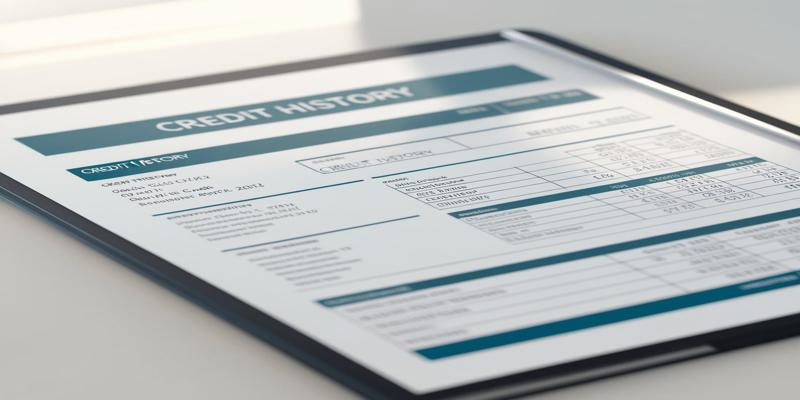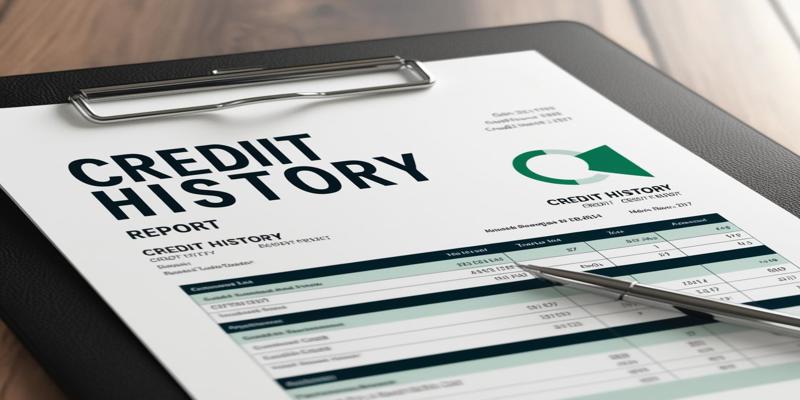Why Building Credit is So Important
Dec 09, 2024 By Elva Flynn
It's like your financial fingerprint that will eventually accompany you throughout your life. Being intrinsic to your general financial health, everything from loan approvals to interest rates depends on it. The following article will show why a good credit history is essential and how it affects your life while realistically showing what steps one can take to improve and protect one's credit rating.
What is Credit History?
 Your credit history is a record of your financial activities over time, mainly how you handle credit and debt. This essential financial profile affects everything in your financial life, from taking loans to renting.
Your credit history is a record of your financial activities over time, mainly how you handle credit and debt. This essential financial profile affects everything in your financial life, from taking loans to renting.
Components of Credit History
A typical credit history will contain several key elements:
- Payment history encompasses your record of on-time or late payments for items such as credit cards and loans, among other financial obligations.
- Credit utilization: This measures how much credit you are using out of the total available to you at any time.
- Length of credit history: A factor based on how long you have had different types of credit accounts open.
- Credit mix: What variety of credit products do you have experience with, such as credit cards, mortgages, or personal loans?
- Recent credit inquiries: When lenders access your credit report, or anyone else does.
Importance to Financial Health
Your credit history is a report card showing how well you manage credit. It gives lenders and other interested parties an idea of how well you handle credit. A good credit history may unlock better financial opportunities, while a poor history can hinder it.
For instance, a strong credit history can help you:
- Qualify for lower interest rates on loans and credit cards
- Increase your chances of approval for rental applications
- Potentially lower your insurance premiums
Establishing and Maintaining Good Credit
Establishing a good credit history will require time and genuine commitment. In other words, it will involve regular, responsible credit use, timely payments, and avoidance of overextension. Know what goes into your credit history, manage those items, and you are on your way to a better financial future.
Why is Your Credit Score Important?
Your credit score is more than a number; it opens up a world of financial possibilities and defines economic futures. Being adequately informed about the subject will enable one to make informed choices and be confident when dealing with what can be quite a perplexing world of personal finance.
Access to Financial Products
Your credit score mostly impacts the degree to which you can access financial products, such as Mortgages, Automobile loans, Credit cards, and Personal loans. The better your credit score, the better the terms and the lower the interest rates you can get on such financial products. This can save you thousands of dollars over the life of a loan.
Impact on Life Beyond Lending
Your credit score may also affect other areas of your life:
- Renting: Your credit score may be used by landlords to gauge your likelihood as a reliable tenant.
- Employment: Employers may check your credit report during the hiring process, especially for positions in finance.
- Insurance Rates: Most states allow insurance companies to utilize credit-based insurance scores when calculating the cost of both auto and homeowners policies.
Financial Freedom and Opportunities
Good credit opens more doors and gives you negotiation leverage. You might be able to do all of the following:
- Negotiate terms with the lender
- Use special offers and rewards programs
- Take advantage right away if an emergency or an opportunity pops up
How to Build Good Credit
 Building a good credit history is a vital element in your financial success. Here's a successful strategy to help you develop and maintain good credit.
Building a good credit history is a vital element in your financial success. Here's a successful strategy to help you develop and maintain good credit.
Pay your bills on time.
Making timely payments is the foundation of any good credit score. Ensure you never make a late payment by setting automatic setup or reminders. Remember, one late payment can harm your credit for several years.
Maintain low credit utilization.
Credit utilization shows how much credit you're using about your limits. It should always be below 30%. For example, if your credit card limit is $1,000, you should keep it below $300. This will show lenders that you can use credit responsibly.
Diversify Your Credit Mix
It will be a plus for your general credit score that you have different kinds of credit. This may include various combinations of credit cards, installment loans, and mortgages. However, you only need to open accounts that you can manage responsibly.
Regularly Check Your Credit Report
You should check your credit report at least once a year from the three major credit bureaus: Equifax, Experian, and TransUnion. Look for errors or signs of identity theft. When you find errors, dispute them on the spot to safeguard your credit history.
Be Patient and Consistent
Building good credit takes time. Stick to these practices, and your credit score will rise over months and years. It is important to remember that bad credit cannot be fixed overnight, but sound financial habits must be developed and consistently followed.
How to Improve Credit Score Tips
Improvement in credit score is a part of attaining sound financial health and opening better financial options for you. Here are some practical ways to enhance your creditworthiness:
Pay Your Bills on Time
Good credit depends largely upon timely payment. Consider setting up automatic bank drafts or just reminders so you won't ever need to bother yourself with due dates. You may notice your score hit the floor just from one late payment. Therefore, pay your bills regularly.
Keep Credit Utilization Low
The second significant factor is your credit utilization ratio the percentage of credit you use compared with what's available to you. Keep it below 30%. Pay down existing balances and ask for credit limit increases to improve this metric.
Diversify Your Credit Mix
Lenders like to see you can responsibly handle different types of credit. A good mix may include one credit card, auto loan, and mortgagehowever, only open new accounts when you need them and can handle the new account responsibly.
Check Your Credit Report Regularly
Check your credit report once a year for mistakes or fraud. You can request a free report from each of the three major bureaus once every year. When you find errors, dispute them as soon as possible without delays, which will probably lower your score.
Be Patient and Consistent
Changing good financial habits requires patience and investment in time into the process. It is these changes that will be long-lasting and improve your credit score. Steer clear of those quick fixes or those credit repair scams promising overnight miracles-more often than not; they do more harm than good.
Conclusion
Your credit history is the background, in a nutshell, of your financial life. The excellent credit record allows for better loan terms, lower interest rates, and more economic opportunities. On a sound credit foundation, you will be all set on your successful journey to realize your financial goals and secure a bright economic future.








